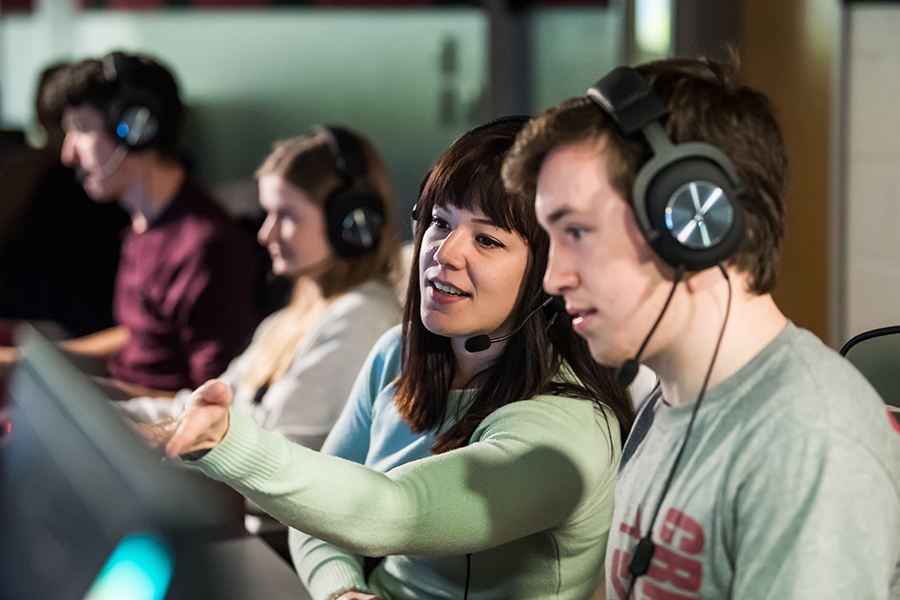Here’s What Gen Z Is Doing for Fun in Philly During the Pandemic

In a different kind of year for sports, one steadily growing trend suddenly accelerated—esports. Through Twitch, YouTube and countless other platforms, Gen Z appears to have fully adopted esports as the pastime of its generation—Twitch viewership alone has grown by 17 percent to 3.1 billion hours watched.
And while Philly has always embraced an underdog role when it comes to sports, this time, thanks to a reputation for innovation and STEM education, it’s coming out of the gate in the lead. Stadiums and esports clubs are rising around the city, colleges are starting programs and teams and a new industry and workforce is gaining steam, making Philly one of the most promising cities in the nation for the new sport.
Suddenly, being a gamer isn’t just a hobby that makes parents raise their eyebrows—it’s set to become an important part of our city’s future. The main question that remains is, just how big will esports become?
America’s Newest Pastime
“I would definitely say it has the ability to become a fifth or sixth major sport,” Ashley Dabb, M.S., professor of sports and esports marketing at Saint Joseph’s University, says. “You’re seeing the average age of fans is much older, particularly baseball and football. What esports has harnessed is similar to what soccer has done in engaging the millennial audience, but esports fans are even younger and more tech savvy.”
For years now, the data has backed up observations like this from Dabb and other experts, even as older populations remain less aware of esports.
“It really is driven by social media. It’s not just a game—it’s a culture,” Jill Bodensteiner, director of athletics at Saint Joseph’s University, says. “Professional gamers have millions of followers on Twitch and YouTube, so that’s a built-in audience for each of their games. There are more people viewing some esports events on their respective platforms than professional leagues’ championship games.”
While that growth has occurred primarily in the digital sphere, there’s an increasing amount of physical evidence that esports has arrived—particularly in Philadelphia, thanks to the city’s growing reputation for strong universities and tech innovation — and it’s long-held reputation for having the best fans.
“We feel that Philadelphia is becoming the East Coast epicenter of gaming,” Bodensteiner says. Spots for professional gamers to gather are being built all over the city. Nerd Street, an organization based around Philadelphia’s 3rd Street (known for its collection of tech startups and innovators) has begun plans for The Block, a gaming hub for professional esports teams. At Philadelphia’s sports complex, a multimillion-dollar arena has been built for the Philadelphia Fusion, Philly’s first esports home team.
Esports All the Way Down
Bodensteiner says that Saint Joseph’s University recently partnered with the 76ers’ professional NBA2K team, the 76ers Gaming Club, so that students can learn about the industry—from sports marketing to event management and more—from professionals working in the field. It reflects a growing trend in esports. It’s not just for semi-pro and pro gamers, but an industry that creates everything from stable, innovative careers to high school- and college-level athletic leagues.
You can see this in the way that more colleges and universities are including esports in their athletic and business education programs. In Philadelphia, Saint Joseph’s University is leading the charge. Its innovative esports program features both a club team and a business education curriculum, with a newly built esports facility containing 22 gaming stations and spaces designed to enable effective coaching and game-planning. It opened in March 2020, just as the pandemic took hold in the U.S. While facility use was limited, thanks to the digital nature of esports, the club team is still able to compete.
“It was the only club sport that was able to play when the pandemic first hit,” Bodensteiner says. “We joined the conference, and our team finished in the top 16 in the country for Super Smash Bros.”
While some parents may be skeptical about esports as a, well, sport, Bodensteiner points out that it provides many of the most important skills that students learn from traditional club sports, in addition to new skills that are critical in an increasingly digital world.
“I think a lot of parents picture their 15-year-old alone in a basement, but we’re playing a team game that requires quite a bit of collaboration and training,” Bodensteiner says. “Playing esports also teaches you how to communicate with people when you can’t see them face-to-face, how to strike the right tone as a leader or interpret requests when you aren’t physically interacting, and that’s something we are all having to learn how to do right now when using Zoom in the professional world. I think it’s a great way to teach those skills and open up those experiences to people whom society has not traditionally seen as athletes.”
“It’s a way to re-energize our country and our youth regarding accessibility and opportunities of STEM careers,” she says. “We have fallen behind the rest of the world in some areas, so you’re seeing K-12 educators and staff use this as a route to say, ‘Maybe you’re not interested in traditional engineering yet, but how about if we learn how game design works?’”
Careers in Esports
Just as the social media boom created a wave of young tech entrepreneurs who understood the youth-driven mode of communication best, the esports boom has created careers for young workers just entering the market.
“The average age of people who really, really understand this industry is about 20,” Bodensteiner says.
To capitalize on the opportunity presented by the new field, Saint Joseph’s has expanded their unique sports marketing program to include classes specifically devoted to esports. In addition to the 76ers GC partnership, the program has cultivated a slew of guest speakers in the ever-evolving industry, and the esports lab is used by the course to provide students hands-on experience with the sport that they’ll be promoting, managing, or otherwise working in.
“The variety of careers available matches the number of careers available in traditional sports, from agents to marketers to engineers who handle the technical setup of events,” Bodensteiner says. “Besides the fact that the industry is growing, we feel that it’s recession-proof and pandemic-proof.”
Coursework addresses everything from traditional sports marketing principles to how to handle contract negotiations with online stars to fan experience and fanbase development. To provide real-world experience that will complement the curriculum, Dabb is currently building a fully rounded internship program through partnerships with the many esports institutions in the city.
The first Saint Joseph’s student to be placed in an esports internship, Ryan Kelly, is currently at Nerd Street. “Because it is such a young industry, Ryan has been able to step up and be an important contributor to the team as an intern,” says Dabb. “That’s the advantage for students interested in the business side of esports.”
While some might presume the growth of the industry will slow down once the pandemic ends, Dabb and other industry professionals feel that actually, the sport will only continue to grow.
“A lot of the revenue that drives esports is actually in championships, which occur in live stadium events,” Dabb says. “I still think there’s a kind of magic in the energy of a live crowd, and obviously that’s not happening right now. So even if the pandemic attracted more attention to esports, it’s actually set to grow even more as things get back to normal.”
Learn more about Saint Joseph’s University and their esports opportunities for undergraduate students here.
This is a paid partnership between Saint Joseph's University and Philadelphia Magazine


